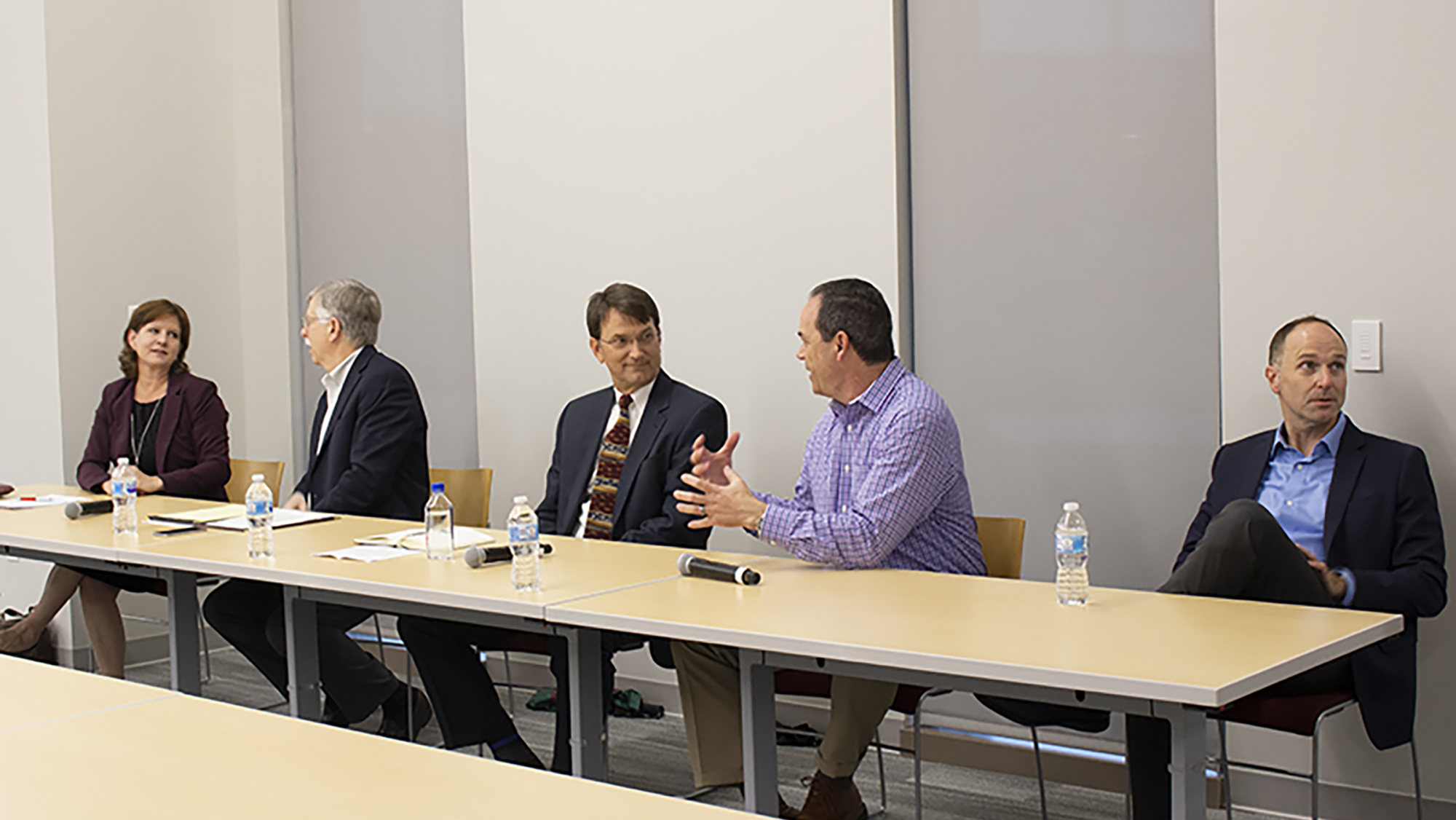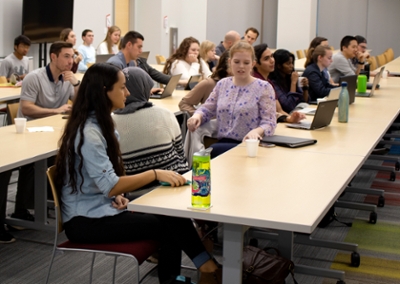
To help students learn more about the many different roles biomedical engineers can play in the medical device and health care industries, the Department of Biomedical Engineering at Texas A&M University invited industry experts, which included former students, to speak at the department’s first Experts Panel event this fall.
The panel provided a forum for students who are looking for jobs and careers in industry to hear from experts in the field. Each expert shared their own background in industry, with careers ranging from manufacturing to research and development to quality engineering.
While each had a different story, panelist Tony Knight, director of quality at Medtronic Neurosurgery in Dallas, said initially graduates should expect to gain knowledge in many areas once they enter industry before they decide what they want to pursue in their career.
“Choose after five or six years as you’re moving through your career where you want to focus and specialize,” Knight said.
Students submitted questions for the panelists before the event and several were asked during the evening as well. One question was what students should pursue in college to best prepare them for the working world.
Keith Nelson ’82, head of operational excellence at Novartis in Dallas, said leadership is key to standing out in an engineering environment.
“What separates the good new hires from the questionable new hires is their ability to lead others,” Nelson said. “You’re leading yourself, and you are leading two, three, maybe up to six people. To prepare for that you’re going to need to demonstrate leadership.”
Another skill that helps applicants stand out is problem solving, said Jeff Summers, moderator of the panel and vice president of operations at Quest Medical, Inc. in Dallas.
“You need to seize problem-solving opportunities while you’re here. Whether that be in your classes or your group, you have senior design, the ENGR[x] program and others,” Summers said.
Students asked whether the panel members thought getting a master’s degree right after their bachelor’s degree was preferred. There were mixed responses from the panel.
Mike McGee ’78, and vice president for research administration at the Texas Heart Institute in Houston, planned to get his master of science after graduating, but changed course after he got a job at the Texas Heart Institute.
“I am one of the biggest advocates of the master of science program,” McGee said. “I kind of regret not getting it later in life.”
Building from that comment, Steve Golden ’90, and chief operating officer at Coracoid Solutions, LLC in California, said starting to work in industry doesn’t mean further education is no longer an option.
“Some of you want to get out into the workplace as fast as you can, that’s just fine,” Golden said. “There’s always time to go back for more education. That door doesn’t necessarily close.”

Two of the panelists have experience with startup companies, a topic about which biomedical engineering senior Linda Bustaman was excited to learn.
“I love the idea of working at a startup,” Bustaman said. “I’ve talked to some of my professors, and a lot of them say, ‘Since you’re young, you should definitely go do a startup because you don’t require that much health insurance when you’re younger compared to when you’re older.’”
Golden has started several companies and said finances can be a significant hurdle for a startup. On top of that, he said that overcoming the fear of failure is really the key.
Jacqueline Havelka ’87, and co-founder and director of the technical writing company Inform Scientific, said it takes a lot of gumption to start a company.
“You have to really choose your business partners wisely,” Havelka said. “You don’t want someone to steal your idea.”
Hal Xu, second-year graduate student, said he appreciated how the panel included experts from different engineering areas.
“They were answering the same questions, but there were really different answers from everyone, so it gives a pretty good perspective on all the areas like quality, manufacturing and R&D,” Xu said. “I’m not too sure specifically which area I want to go into, so this was helpful.”
Olivia Cain, biomedical engineering senior and member of the Biomedical Engineering Society at Texas A&M, said she was curious to see what the panel was about, and appreciated the personal points of view from the different panelists.
“I definitely feel this is beneficial for those who are earlier on in their education because the advice they had was go get leadership experience, go show you’re passionate,” Cain said. “As a fifth-year senior, I don’t have the time or ability to go back and do that. But for them they have the opportunity still to achieve those things before they graduate. I think this would be very valuable for them.”
The Department of Biomedical Engineering plans to host similar experts panels in the future as a way to expose students to different career options as well as help them gain experience networking with former students in the medical device industry.